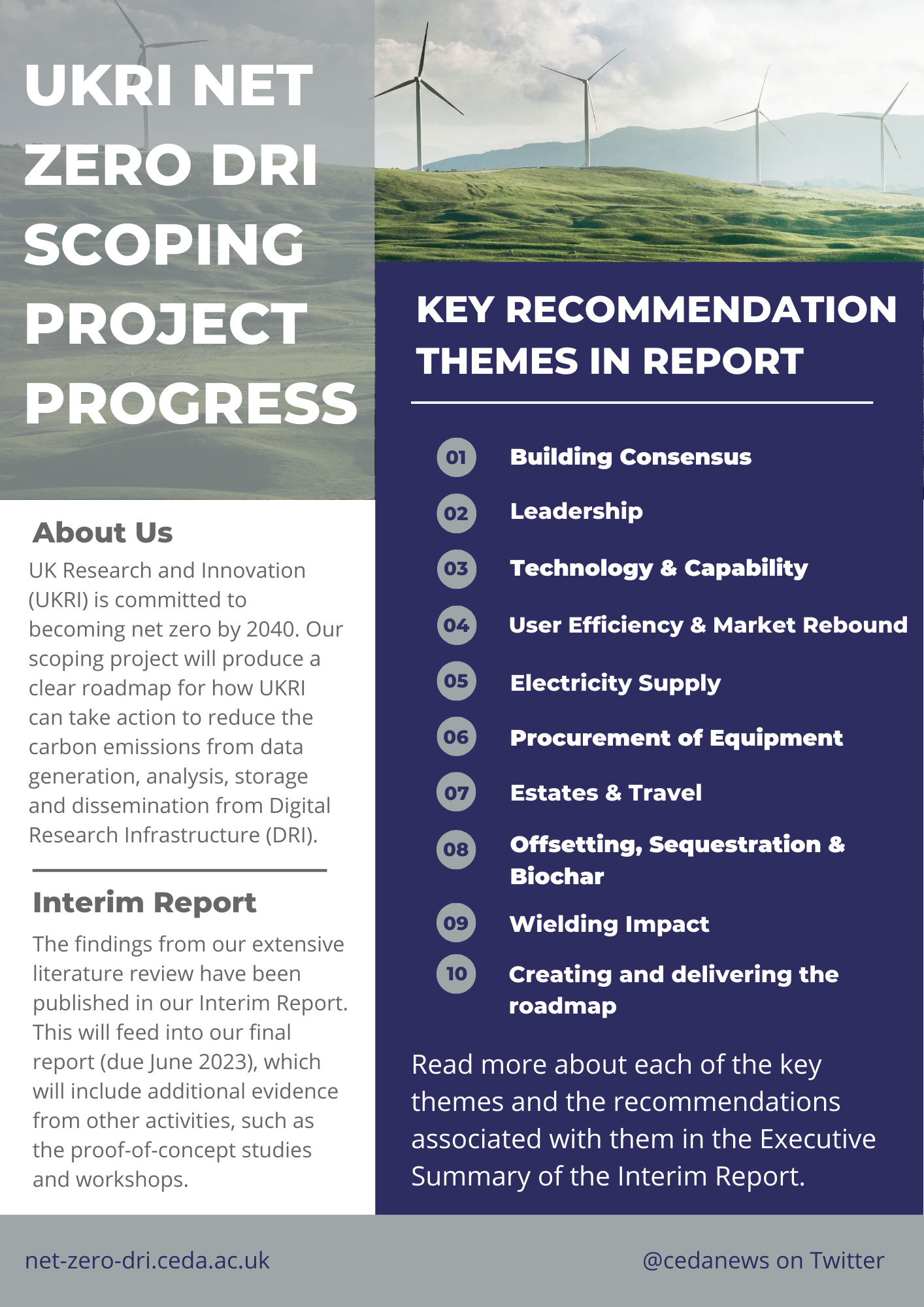Publishing our Interim Report
Complexity, Challenges and Opportunities for Carbon Neutral Digital Research
An Interim Report called ‘Complexity, Challenges and Opportunities for Carbon Neutral Digital Research’ has been published by the UKRI Net Zero DRI Scoping Project team. The report summarises the key evidence-based recommendations for reaching the UKRI’s net zero targets for digital research infrastructure (DRI) by 2040. The findings have been collected from an extensive literature survey and will form the technical foundations of the Final Report, which is due for completion in June 2023.
We invite the community to read the report and welcome further discussion from interested parties in a webinar hosted by the UKRI Net Zero DRI Scoping Project Team. The webinar is on Friday 9th September at 11:30am – register to attend here.
This webinar will cover the following:
- The key recommendations from the Interim Report
- Discussion about the findings
- Information about future events and activities.
The key initial recommendations in the report cover ten themes (see Figure 1). Some of these include, but are not limited to:
-
Swift action based on a recognition of the severity of the climate emergency;
-
Sustainable procurement of equipment;
-
Effective and adaptable leadership to form a focus of activity;
-
The adoption of sustainable multi-year power purchase agreements where green electricity generation is not possible.
Further workshops and technical studies in the remaining 9 months of the project will lead to additional recommendations.

Figure 1: an infographic that summarises the interim report’s key recommendations.
Example of a challenge addressed in the Interim Report: The Rebound Effect
One example of a consideration that the project has identified that must be accounted for in the net zero DRI roadmap is the rebound effect. This refers to the phenomenon that when systems expand in capacity or become more efficient, the user behaviour is to again use up all available storage space, rather than maintaining the existing level of productivity. While efficiency savings are paramount for the transition to net zero DRI, the report explains that there must be a framework to enable the conversion of efficiency gains into carbon savings. If this is not achieved, there is high risk of expanding demand and greater resource usage. The project’s interim recommendation is that the introduction of new technologies should be matched by appropriate training and user support. Concepts such as offsetting appropriately, sequestration and making policies mandatory in a similar way to Health and Safety policies are also explained in detail.
The Interim Report is an extensive document but is split into manageable sections:
Executive Summary – this summarises the projects recommendations (based on the findings in the rest of the report)
Synthesis – this section provides a synthesis of the key areas covered in the literature review, with links to more detailed discussion of individual papers in subsequent chapters.
Introduction – outlines the context and aims of the report/project
Background - this section frames the wider problem and provides context (based on literature)
Key findings – this expands on the details discussed in earlier chapters
The project will produce two more reports:
-
A 2nd interim report (due in early 2023) - this will provide initial recommendations based on the evidence collected by the project partners (such as the proof-of-concept studies)
-
Final report (due in June 2023) - this will summarise all the evidence gathering activities undertaken by the project and provide final recommendations
The project team have also been producing dissemination materials, such as infographics and videos. You can see examples of these on our Twitter page. If you would like access to these to help us promote the project, please get in touch.
To keep up to date with the project’s progress and findings, sign up to the mailing list or follow us on Twitter. If you have any questions please contact the CEDA helpdesk, making clear that you are interested in the UKRI DRI Net Zero Scoping Project.